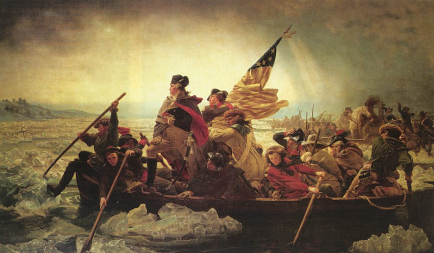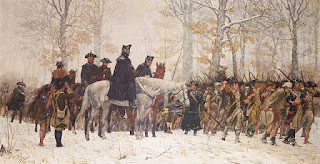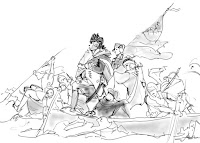The Marquis de Chastellus, a Frenchman who had come over to help the Americans win the fight for freedom, commented on Washington's training skills:
The weather being fair, on the 26th, I got on horseback, after breakfasting with the General. He was so attentive as to give me the horse he rode on the day of my arrival, which I had greatly commended. I found him as good as he is handsome, but above all, perfectly well broke and well trained having a good mouth, easy in hand, and stopping short in a gallop without bearing the bit. I mention these minute particulars, because it is the General himself who breaks all his own horses, and his is a very excellent and bold horseman, leaping the highest fences, and going extremely quick, without standing upon his stirrups, bearing on the bridle, or letting his horse run wild.
 Washington believed horses must be given proper care and exercise, and that it was wrong to beat a horse, deny him proper food or water, or to over-work him. Early in Washington's pubic career as a 21-year-old diplomat, he had to make an arduous mid-winter trip to the French commander at what is now Erie, Pennsylvania. Upon returning to Virginia from this parley in early January 1753, his horses grew weak from struggling through deep snow and a lack of fodder. Realizing that riding the horses farther would cause them pain and might even kill them, Washington gave them to a tribe of local Indians. He and his companions then continued the journey on foot.
Washington believed horses must be given proper care and exercise, and that it was wrong to beat a horse, deny him proper food or water, or to over-work him. Early in Washington's pubic career as a 21-year-old diplomat, he had to make an arduous mid-winter trip to the French commander at what is now Erie, Pennsylvania. Upon returning to Virginia from this parley in early January 1753, his horses grew weak from struggling through deep snow and a lack of fodder. Realizing that riding the horses farther would cause them pain and might even kill them, Washington gave them to a tribe of local Indians. He and his companions then continued the journey on foot. During the Revolutionary War, two of Washington's war-horses were Nelson and Blueskin. These horses had been out on the front lines with the general, and were known for their bravery and steadfastness under fire.
At the Second Battle of Trenton on January 2, 1777, Washington positioned the great charger, Nelson, on the bridge over which his retreating soldiers had to cross. British cannon shells were bursting all around, but neither Washington nor Nelson showed any fear. A soldier wrote home later that the two standing there bravely were a symbol of strength to him. He wrote, “As I crossed the bridge crowded with fellow soldiers, I brushed up against the boot of the man and flank of the horse. Both seemed to exude courage.”
At the Battle of Princeton on January 3, 1777, Washington was at the front of the action. Waving his hat and seated upon Nelson, he rode between the two opposing lines of British and American soldiers. When the British cannons fired, Washington was no more than thirty yards from their maws. American Colonel Richard Fitzgerald remarked later: "I covered my face with my hat for fear of seeing my general hit. But upon replacing my hat, I saw many men dead or dying but miraculously the General was still astride his horse and unharmed.” Washington’s extraordinary bravery set the tone of this engagement. His presence rallied the Americans, and they began charging toward the British. It was the first time in open combat during the war that the Americans had made a British line break and run. Urging his men on in vigorous pursuit, Washington shouted, “Come on boys, its a fine day for a fox hunt!"
At the battle of Monmouth in June 1778, the treacherous General Charles Lee, in charge of the attacking first wave of Americans, had called for a retreat in direct violation of his orders. Washington, to his utter dismay, saw his soldiers coming back toward the rear. He stormed forward cursing Lee and summarily dismissed him to the rear. Washington then rode Nelson in the line of fire back and forth before his men, blocking their retreat and redirecting toward the British yelling, “Rally around me, Boys!” The Continental Army then drove the British completely out of New Jersey and into New York.
Many years later, Washington resigned his commission before Congress in Annapolis, Maryland. He hurried home to Mt. Vernon, where he arrived on December 24, 1783. As a reward for their loyal service, and possibly as a Christmas present, Washington retired Nelson and Blueskin to pasture. Nelson had been his main mount, but both horses had served him well during the 8 1/2 years of the Revolutionary War. John Hunter, in a visit to Mount Vernon in 1785, wrote that he went
to see Washington’s famous race-horse Magnolia--a most beautiful creature... I afterwards went to his stables, where among an amazing number of horses, I saw old Nelson, now 22 years of age, that carried the General almost always during the war; Blueskin, another fine old horse next to him, now and then had that honor. Shaw also showed me his old servant, that was reported to have been taken, with a number of the General's papers about him. They have heard the roaring of many a cannon in their time. Blueskin was not the favorite, on account of his not standing fire so well as venerable old Nelson.
Website: cynthiahodges.com
Juris Doctor: South Texas College of Law (Houston, TX)
LLM (Environmental Law): Lewis and Clark Law School (Portland, OR)
Masters of Arts (Germanic Studies): The University of Texas at Austin








